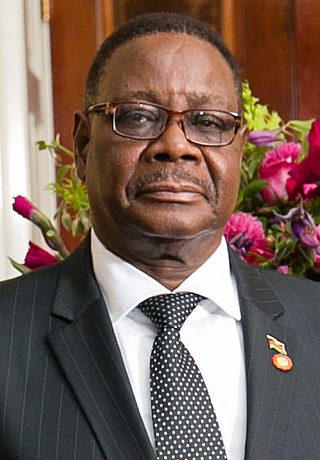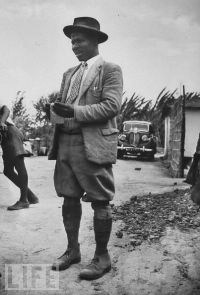Related Research Articles

Malawi, officially the Republic of Malawi and formerly known as Nyasaland, is a landlocked country in Southeastern Africa. It is bordered by Zambia to the west, Tanzania to the north and northeast, and Mozambique to the east, south and southwest. Malawi spans over 118,484 km2 (45,747 sq mi) and has an estimated population of 19,431,566. Malawi's capital is Lilongwe. Its second-largest is Blantyre, its third-largest is Mzuzu and its fourth-largest is its former capital, Zomba.
The history of Zambia experienced many stages from colonization to independence from Britain on October 24, 1964. Northern Rhodesia became a British sphere of influence in the present-day region of Zambia in 1888, and was officially proclaimed a British protectorate in 1924. After many years of suggested mergers, Southern Rhodesia, Northern Rhodesia, and Nyasaland were merged into the British Federation of Rhodesia and Nyasaland.

Hastings Kamuzu Banda was Prime Minister and later President of Malawi from 1964 to 1994. In 1966, the country became a republic and he became the first president as a result.

Bingu wa Mutharika was a Malawian politician and economist who was President of Malawi from May 2004 until his death in April 2012. He was also President of the Democratic Progressive Party, which he founded in February 2005; it obtained a majority in Malawi's parliament in the 2009 general election.

The Millennium Challenge Corporation (MCC) is a bilateral United States foreign aid agency established by the U.S. Congress in 2004. It is an independent agency separate from the State Department and USAID. It provides grants to countries that have been determined to have good economic policies and potential for economic growth. The country qualification process is objective, involving scores provided by third parties in 20 different areas. An eligible country must apply for a grant with a specific project in mind.

The foreign relations of the Sahrawi Arab Democratic Republic (SADR) are conducted by the Polisario Front, which maintains a network of representation offices and embassies in foreign countries.

Joyce Hilda Banda is a Malawian politician, who served as President of Malawi, from 7 April 2012 to 31 May 2014. Banda took office as President following the sudden death of President Bingu wa Mutharika. She is the founder and leader of the People's Party, created in 2011. An educator and grassroots women's rights activist, she was the Minister of Foreign Affairs from 2006 to 2009 and the Vice-President of Malawi from May 2009 to April 2012. She had served in various roles as a member of Parliament and as Minister of Gender and Child Welfare before she became the President of the Republic of Malawi.

Madame Callista Chapola-Chimombo is a Malawian politician and the widow of President Bingu wa Mutharika. She served as the First Lady of the Republic of Malawi from 2010 to 2012. Chimombo is a previous member of the Cabinet of Malawi as a National Coordinator of Maternal, Infant and Child Health and HIV/Nutrition/Malaria and Tuberculosis.

The 2008 Lebanon conflict was a brief intrastate military conflict in May 2008 in Lebanon between opposition militias and pro-government Sunnis, after the 18-month-long political crisis spiraled out of control, when the government's decision to dismantle Hezbollah's telecommunication system, which led to Hezbollah seizing control of west Beirut, and ended with the adoption of the Doha Accord in 2008.

The Federation of Rhodesia and Nyasaland, also known as the Central African Federation (CAF), was a colonial federation that consisted of three southern African territories: the self-governing British colony of Southern Rhodesia and the British protectorates of Northern Rhodesia and Nyasaland. It existed between 1953 and 1963.

Arthur Peter Mutharika is a Malawian politician and lawyer who was President of Malawi from May 2014 to June 2020. Mutharika has worked in the field of international justice, specialising in international economic law, international law and comparative constitutional law. He informally served as an adviser to his older brother, President Bingu wa Mutharika, on issues of foreign and domestic policy from the onset of his election campaign until the President's death on 5 April 2012.

The Cabinet of Malawi is the executive branch of the government, made up of the President, Vice President, Ministers and Deputy Ministers responsible for the different departments.

James Frederick Sangala was a founding member of the Nyasaland African Congress during the period of British colonial rule. Sangala was given the nickname "Pyagusi", which means "one who perseveres".

The Cabinet of Sudan usually refers to the chief executive body of the Republic of the Sudan. The Cabinet was dissolved following the 11 April 2019 Sudanese coup d'état. Chapter 5 of the August 2019 Draft Constitutional Declaration defines the procedures which led to the nomination of Abdalla Hamdok as Prime Minister, and up to 20 Ministers in the Cabinet, during late August 2019, for the 39-month democratic transition. The Sudanese Women's Union protested against this. Under Article 19 of the Draft Constitutional Declaration, the ministers of the Transitional Cabinet are ineligible to run in the election scheduled to follow the transition period.
The 2011 Malawi protests were protests aimed at winning political and economic reforms or concessions from the government of Malawi. On 20 July, Malawian organisations protested against perceived poor economic management and poor governance by President Bingu wa Mutharika and his Democratic Progressive Party. After the first two days of protests, 18 deaths, 98 serious injuries and 275 arrests had been reported. Further demonstrations were organised on 17 August and 21 September The first protest was later cancelled due to the intervention of a UN representative in initiating a dialogue; however, the talks broke down with more protests planned for Red Wednesday through a national vigil.

Nancy Tembo is a Malawian politician and serves as Minister of Foreign Affairs in the Malawi Government since 2022. She is also a Member of Parliament (MP) representing Lilongwe City South West constituency in the National Assembly of the Republic of Malawi.
The Human Rights Consultative Committee is a civil rights organization in Malawi. They are committed to the promotion and protection of human rights for the Malawi. Their activities include advocacy, monitoring, information sharing, capacity building and resource mobilization for member institutions, government and key stakeholders. The organization has been involved in human rights issues in Malawi since July 1995. The committee consists of a network were Church Institutions, Human Rights NGOs and the Law Society of Malawi work together in areas of human rights, advocacy and information sharing. HRCC is thus works as a network of local Civil Society Organizations (CSOs) and Non-Government Organizations (NGOs) that have interest in protecting people’s rights, promoting the human rights agenda, and safeguarding governance and the rule of law.

Lazarus McCarthy Chakwera is a Malawian politician and theologian who has served as President of Malawi and Minister of Defence since June 2020. He also serves as Minister of Defence per Malawian constitution, he has served as the leader of the Malawi Congress Party since 2013. He was President of the Malawi Assemblies of God from 1989 to 2013.

The 2019–2022 Sudanese protests were street protests in Sudan which began in mid-September 2019, during Sudan's transition to democracy, about issues which included the nomination of a new Chief Justice and Attorney General, the killing of civilians by the Rapid Support Forces (RSF), the toxic effects of cyanide and mercury from gold mining in Northern state and South Kordofan, opposition to a state governor in el-Gadarif and to show trials of Sudanese Professionals Association (SPA) coordinators, and advocating the dismissal of previous-government officials in Red Sea, White Nile, and South Darfur. The protests follow the Sudanese Revolution's street protests and civil disobedience of the early September 2019 transfer of executive power to the country's Sovereignty Council, civilian prime minister Abdalla Hamdok, and his cabinet of ministers. Hamdok described the 39-month transition period as defined by the aims of the revolution.

The 17 October Protests, commonly referred to as the 17 October Revolution were a series of civil protests in Lebanon that began after the Lebanese cabinet announced financial measures on 17 October 2019. These national protests were triggered by planned taxes on gasoline, tobacco, and VoIP calls on applications such as WhatsApp, but quickly expanding into a country-wide condemnation of sectarian rule, the stagnation of the economy, unemployment, endemic corruption in the public sector, legislation that was perceived to shield the ruling class from accountability and failures of the government to provide basic services such as electricity, water, and sanitation.
References
- ↑ "MALAWI: Government Becomes a One-Man Show - IPS". Ipsnews.net. 2011-09-02. Archived from the original on 2011-11-01. Retrieved 2011-10-05.
- ↑ "Southern Africa: SADC Secretary Proposes Common Solutions for Problems in Region". allAfrica.com. 2011-08-13. Retrieved 2011-10-05.
- ↑ "Malawi: Concerns of Protesters Need to Be Taken Seriously". allAfrica.com. 2011-07-29. Retrieved 2011-10-05.
- ↑ greenacres July 12, 2011 - 2:20 pm (2011-07-12). "Wa Mutharika advised to trim cabinet". The Malawi Democrat. Archived from the original on 2011-07-13. Retrieved 2011-10-05.
- ↑ "Malawi government fast becoming one-man show". Thenewage.co.za. Archived from the original on 2012-09-20. Retrieved 2011-10-05.